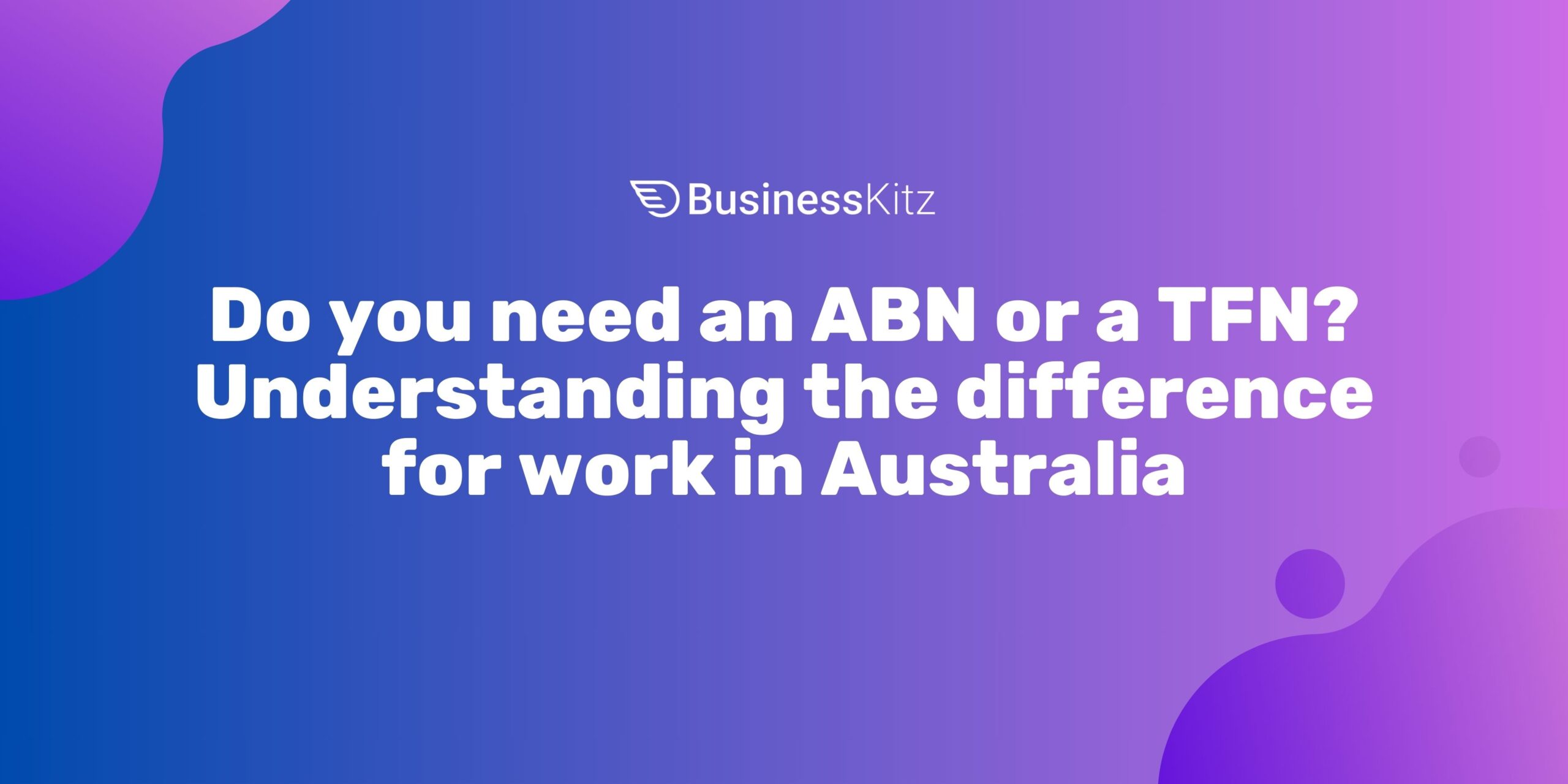
We've helped businesses save $55m with our all-in-one platform. Get instant access to this template and 115+ others, plus AI-powered document creation, starting completely free.
Understanding whether you need an ABN or a TFN is essential when working or running a business in Australia. These identifiers play different roles in the tax system. A TFN is used for managing income tax and superannuation, while an ABN is critical for business operations like invoicing and GST registration. Knowing when and how to use each keeps your finances on track.[ez-toc]
An ABN and a TFN are key identifiers in Australia’s tax system. A TFN is a nine-digit number for individuals and organisations to manage tax, lodge returns, and track superannuation. An ABN is an 11-digit number for businesses to invoice, register for GST, and comply with tax laws. Both ensure smooth financial and legal operations.
If you plan to work in Australia, understanding the Tax File Number (TFN) and Australian Business Number (ABN) is essential. These numbers are key identifiers in the Australian tax system, helping individuals and businesses comply with tax laws and handle payments smoothly. Knowing when to use a TFN or ABN ensures you meet legal requirements and avoid unnecessary complications.
Australia’s tax system uses specific numbers to track and manage income tax, superannuation, and business dealings.
These identifiers have different purposes but work together to keep the tax system efficient.
Using the wrong identifier can cause issues like excessive tax withholding or delays in payments.
Understanding how these numbers work helps prevent mistakes and keeps your finances on track.
This information is vital for:
By understanding TFNs and ABNs, you can navigate the tax system with confidence and focus on your work.

A Tax File Number (TFN) is a unique nine-digit number issued by the Australian Taxation Office (ATO). It identifies individuals and organisations for tax purposes. A TFN is essential for anyone earning income in Australia or dealing with the tax system.
A TFN is necessary for:
A TFN serves several purposes. These include:
Maria is a foreign resident working in Australia. Before starting her job, she applies for a TFN online through the Australian Taxation Office. This ensures her employer deducts tax at the correct rate. Maria can also lodge her tax return at the end of the financial year to claim any refund.A TFN is vital for anyone earning income or working under a contracting arrangement in Australia. It ensures smooth taxation and access to important services.
An Australian Business Number (ABN) is a unique 11-digit number that identifies businesses and organisations in Australia. It is issued by the Australian Business Register (ABR) and plays a key role in business operations and taxation.
You need an ABN if:
An ABN has many practical applications, including:
Alex is a freelance graphic designer. To invoice clients and claim GST credits, he applies for an ABN through the ABR. The process is simple, and Alex receives his ABN quickly. With it, he can operate professionally, avoid withheld payments, and ensure his taxes are in order.An ABN is essential for anyone operating in Australia as a business. It ensures compliance with tax laws and supports efficient business practices.

An ABN and a TFN serve different purposes, but both are crucial for the Australian tax system. Understanding how they work can help individuals and businesses meet their tax obligations and operate efficiently.
AspectTFNABNPurposeTax identificationBusiness identificationWho uses it?Individuals and businessesSole traders, partnerships, companiesUsageTax returns, superannuationInvoicing, GST registrationRequired forFiling personal taxesOperating a business
For sole traders, an ABN and TFN often complement each other. While the TFN is needed to file a tax return and manage superannuation, the ABN is essential for invoicing and claiming GST credits. For example, if you work as a sole trader, you must provide your ABN on invoices to avoid tax being withheld. Your TFN is used to report income and calculate the correct tax.
Knowing the key differences and how these numbers work together helps avoid errors. If you’re unsure, the ATO provides clear guidelines to ensure compliance.
Knowing when to use a TFN or ABN depends on the type of work you do. Both identifiers have specific roles, and in some cases, you may need both. Business Kitz offers document templates to help get you started, such as our Invoice templates for GST-registered and non-GST-registered businesses and sole traders.
A TFN is necessary for:
You need an ABN if you:
Some people need both a TFN and an ABN. For example, if you work part-time as an employee and operate a side business as a freelancer, you need a TFN for your employer and for filing your individual tax, and an ABN for invoicing clients.
Using an ABN when you should work under a TFN can cause issues. This practice, known as sham contracting, often leads to penalties from Fair Work or the ATO. If unsure, seek advice to ensure you comply with tax laws.Understanding when to use a TFN or ABN ensures smooth operations and compliance with Australian tax requirements.

Applying for an ABN or a TFN is a straightforward process, but you need the right documents and details. Follow these steps to ensure a smooth application.
A TFN is essential for individuals and organisations managing their tax obligations.Steps to apply:
Eligibility:
An ABN is crucial for businesses and contractors operating in Australia. You can apply for an ABN via the ABR website.Requirements:
Common rejection reasons:
By following these steps, you can apply for your TFN and ABN efficiently and start meeting your tax obligations.
Managing TFNs and ABNs can feel overwhelming, especially if you're new to the Australian tax system. Understanding these numbers and their correct use is key to avoiding common challenges.
Understanding these challenges and taking proactive steps can simplify tax and business processes. Proper management of your TFN and ABN ensures smoother operations and better financial outcomes.Streamline your business processes further with Business Kitz . Choose from over 100 document templates in our document library, generate templates using our document creator tool, store and manage documents in Business Kitz document vault, and seamlessly send and sign documents through Business Kitz document signing tool plus many more features.
A tax file number (TFN) is a personal nine-digit number used in the Australian tax system. You need a TFN if you earn income, file tax returns, or manage superannuation. Foreign residents working in Australia also need a TFN to avoid higher tax rates.
An Australian business number (ABN) is an 11-digit number for businesses and organisations. You use it to issue invoices, register for GST, and claim tax credits. It’s important for businesses operating in Australia to have an ABN and quote it when invoicing.
Yes, many people need both a TFN and an ABN. For example, if you work part-time and also freelance, you use your TFN for employment tax and your ABN for freelance work. Both must be taken into consideration to ensure compliance with Australian tax laws.
Yes, you must quote your TFN when starting a new job. It ensures your employer deducts tax at the correct rate. Without it, tax may be taken at the highest rate from the source.
Foreign residents working in Australia need a TFN to pay taxes correctly. If they run a business, they must also get an ABN. Both are legally required, depending on the work you do.
If you don’t have a TFN, your employer or bank may withhold tax at the highest rate. Without an ABN, clients may also withhold payments. You can apply for a TFN through the Australian Tax Office and an ABN through the Australian Business Register.
Yes, your TFN links to your superannuation account. It helps track your funds and ensure employer contributions are credited correctly.
Not all businesses need an ABN. Small ventures like personal training or fundraising may not require one. Determine whether you meet the criteria by checking with the Australian Tax Office.
Yes, your TFN stays the same even if you change jobs. Your TFN is unique and applies to all income you earn in Australia.
You can submit an Individual TFN application through the Australian Tax Office. For an ABN, apply online at the Australian Business Register. Ensure you provide accurate details to avoid delays.
Use your TFN to lodge a tax return with the Australian Tax Office. Include all income earned, any PAYG amounts reimbursed, and deductions claimed to determine whether you owe or receive a refund.
TFNs and ABNs are essential parts of Australia’s tax system. A TFN helps individuals manage taxation, lodge returns, and access superannuation. An ABN supports business operations, allowing you to invoice clients, claim GST credits, and meet legal requirements.Using the correct identifier keeps your finances on track and ensures compliance with tax laws. Whether you work as an employee, contractor, or business owner, understanding the role of these numbers avoids mistakes and penalties.Make your tax and business processes easier. Explore Business Kitz tools and get started with a free account to create, manage, and streamline your tax documents today.Disclaimer: This content is intended to be used for educational and informational purposes only. Business Kitz does not offer legal advice and cannot guarantee the accuracy, reliability, or suitability of its website content for a particular purpose. We encourage you to seek professional advice from a licensed professional and verify statements before relying on them. We are not responsible for any legal actions or decisions made based on the information provided on our website.Unless expressly stated otherwise, all content, materials, text, images, videos and other media on this website and its contents are the property of their respective copyright owners.
Copyright © 2025 Business Kitz 14312161